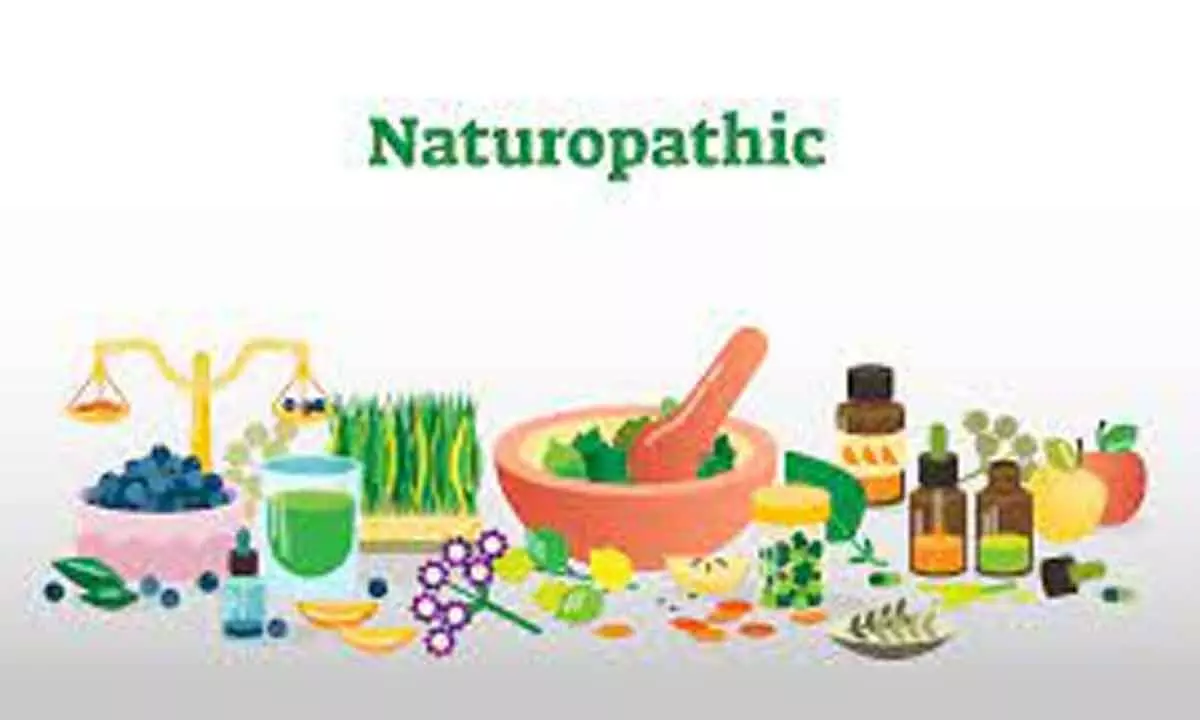Scope and potentiality of naturopathy

A few sincere but misguided enthusiasts are attempting the impossible and bringing ridicule upon themselves, ignorant of the higher possibilities, missing their opportunities and bringing discredit upon themselves and their art.
A few sincere but misguided enthusiasts are attempting the impossible and bringing ridicule upon themselves, ignorant of the higher possibilities, missing their opportunities and bringing discredit upon themselves and their art. Accuracy and efficiency in naturopathy therapeutics is only possible to those who have a clearly defined idea of the field.
It is imperative that healthcare providers have an understanding of the training and scope of other health professionals in order to effectively make decisions regarding research, collaborative clinical care, and policy. Given the prevalence of use of complementary and alternative medicine by people and families in India, and the growing interest in 'integrative' medicine, we aim to offer an overview of naturopathic care for people. This article describes the principles, training, and scope of naturopathic medicine, including health promotion, disease prevention, and illness management. It describes the process by which naturopathic doctors (NDs) create an integrative healthcare plan for people, evaluate and apply evidence, and integrate ethical issues in practice management.
Medical pluralism is an important part of the history of the naturopathic profession. The roots of modern naturopathic training and practice lie in the integration of diverse approaches to health from a variety of doctrines. Some practitioners lean toward more traditional approaches (such as acupuncture or traditional herbal medicine), while others favor methods that have well-understood biomedical mechanisms and a rigorous evidence base. Many work with a combination of the two. Some NDs emphasise lifestyle strategies, while others rely more on the use of natural health products and other approaches.
The principles of naturopathic medicine act as a touchstone for NDs. As with all healthcare providers, NDs are guided by the fundamental principle of no maleficence; five additional principles inform naturopathic care and decision-making, all of which are emphasized throughout training. The Therapeutic Order was designed as a framework for holistic care to which these principles are applied. While a critical part of an ND's role is identifying when more forceful methods and/or referral may be necessary, the principles of the profession remind clinicians to approach families and people holistically, individually, and with the least force possible in order to achieve the therapeutic goal.
Naturopathic Practice
NDs act in general care in both primary and consultative roles. They are trained to promote and monitor healthy growth and development, educate families on preventative strategies, address risk factors for disease, and manage childhood illnesses. As all primary care providers do, NDs may play a number of roles in the care of people: Wellness promotion; Prevention of disease; Surveillance and screening for developmental delay or disease; Management of acute and chronic illness; Coordination of care; Advocacy for a healthy community and environment; and, Wellness Promotion and Prevention of Disease
Working with people and families is the epitome of prevention and health promotion. When a healthy childhood is fostered, there is tremendous potential for lifelong individual and community health. Achieving these purposes requires an appreciation of the determinants of health, and normal growth and development. Progress in hygiene, nutrition, and medical innovation in the past century has shifted the focus of North American pediatric practice from managing infection and malnutrition to preventing chronic conditions that have roots in early life. There is a plethora of evidence highlighting the importance of fostering good lifestyle practices, such as optimal diet, physical movement, sufficient sleep, minimal exposure to environmental toxins, and stress mitigation, and the social and ecological determinants influencing these. Practice models generally ensure that encounter time is adequate to engage with families regarding the determinants of health most relevant to the child, their family, and their broader community, and to offer strategies to promote wellness in both the short and long term.
Naturopathic doctors are taught to draw on conventional standards of care and algorithms to guide diagnostic reasoning and management options, while factoring in frameworks from other medical paradigms (for example, consideration of a Traditional Chinese Medicine diagnosis). Depending on the nature of the illness, the values of the family, and the experience and scope of the clinician, a variety of therapeutic options may be considered. This may include the use of botanical medicines (either topical or oral), other natural health products such as nutritional supplements or probiotics, or hydrotherapy (the therapeutic application of hot and cold water to manipulate circulation). NDs with the training and authority to do so may prescribe or administer pharmaceutical medications; or perform acupuncture, acupressure, or manual therapies (such as soft tissue or joint manipulation).
Those without such authority are trained to appropriately refer to other providers when indicated. Management plans typically include recommendations for optimizing lifestyle factors such as diet, sleep habits, physical activity, stress mitigation and spending time in nature.








